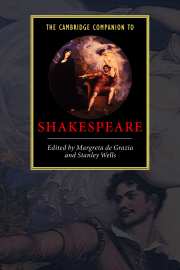Book contents
-
Frontmatter
- 1
Shakespeare’s life
- 2
The reproduction of Shakespeare’s texts
- 3
What did Shakespeare read?
- 4
Shakespeare and the craft of language
- 5
Shakespeare’s poems
- 6
The genres of Shakespeare’s plays
- 7
Playhouses, players, and playgoers in Shakespeare’s time
- 8
The London scene
- 9
Gender and sexuality in Shakespeare
- 10
Outsiders in Shakespeare’s England
- 11
Shakespeare and English history
- 12
Shakespeare in the theatre, 1660-1900
- 13
Shakespeare in the twentieth-century theatre
- 14
Shakespeare and the cinema
- 15
Shakespeare on the page and the stage
- 16
Shakespeare worldwide
- 17
Shakespeare criticism, 1600--1900
- 18
Shakespeare criticism in the twentieth century
- 19
Shakespeare reference books
-
Index
17 - Shakespeare criticism, 1600--1900
Published online by Cambridge University Press: 28 May 2006
- Frontmatter
- 1 Shakespeare’s life
- 2 The reproduction of Shakespeare’s texts
- 3 What did Shakespeare read?
- 4 Shakespeare and the craft of language
- 5 Shakespeare’s poems
- 6 The genres of Shakespeare’s plays
- 7 Playhouses, players, and playgoers in Shakespeare’s time
- 8 The London scene
- 9 Gender and sexuality in Shakespeare
- 10 Outsiders in Shakespeare’s England
- 11 Shakespeare and English history
- 12 Shakespeare in the theatre, 1660-1900
- 13 Shakespeare in the twentieth-century theatre
- 14 Shakespeare and the cinema
- 15 Shakespeare on the page and the stage
- 16 Shakespeare worldwide
- 17 Shakespeare criticism, 1600--1900
- 18 Shakespeare criticism in the twentieth century
- 19 Shakespeare reference books
- Index
Summary
Shakespeare, Ben Jonson assured us, was 'not of an age but for all time'. He might have added that the many eras and countries beyond his own which have appropriated Shakespeare have done so through their own terms and critical categories. The story of Shakespeare's reception by subsequent generations and societies thus involves complex processes of cultural transmission and recontextualization, a pouring, as it were, of Shakespeare's old wine into new cultural bottles that remarkably transforms the wine as it passes from one era or country to the next. It is a story in which we separate at our peril the dance from the dancer, the work from its interpretation. Until very recently, the story of Shakespeare's reception was almost always told as one in which the world gradually came to terms with Shakespeare's inherent and unchanging greatness, so that the post-Romantic apotheosis of Shakespeare as supreme artist was the fixed telos of the narrative of peoples, eras, and nations. Today, however, the separation between our own critical evaluations and the inherent worth of the works of art we are perceiving is less self-evident, and we are less confident that Shakespeare - or any other artist - is for all times and places.
- Type
- Chapter
- Information
-
The Cambridge Companion to Shakespeare , pp. 265 - 278Publisher: Cambridge University PressPrint publication year: 2001



